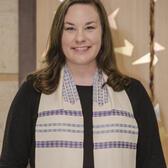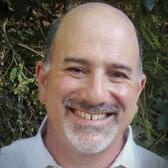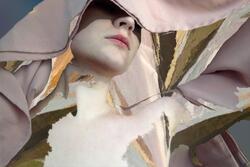Orpah’s Story: A Midrash
Before we start writing any Midrashic Monologue, we study classical midrashic stories about the character(s) we are focusing on. Unfortunately, the patriarchal worldview of generations of rabbis has infected many, many midrashim with a careless misogyny that is deeply painful for us as contemporary rabbis and readers. The stories surrounding Orpah are some of the most egregious examples of this hatefulness that we have ever seen.
The TaNaKh (Hebrew Bible) tells us only that Orpah was the daughter-in-law of Naomi and sister-in-law of Ruth. The ancient rabbis took the handful of verses dedicated to Orpah and expanded them by imagining her as the victim of horrific sexual violence. For this reason, we have very purposefully chosen not to include any quotations from the midrashim that the ancient rabbis wrote about Orpah. You can access the original stories in Babylonian Talmud 42b:7 and Ruth Rabbah 2:20. These texts include descriptions of sexual violence.
In this Midrashic Monologue, we have tried to give Orpah a voice, story, and identity. She deserves infinitely more than generations of our leaders have given her.
“[Naomi’s sons Chilion and Mahlon,] married Moabite women, one named Orpah and the other, Ruth… Then [Naomi’s sons] also died; so the woman was left without her two sons and without her husband. She started out with her daughters-in-law to return from the country of Moab.” – Ruth 1:4
As I walk along with my mother-in-law, Naomi, and my sister-in-law, Ruth, I feel the weight of our supplies hanging from the strong cord draped across my shoulders. Every step causes the rough rope to drag across the back of my neck, burning my skin, marking me, scarring me.
When we camped last night, I lifted my hair to apply a cool compress to my wound. It was then that Naomi saw for the first time that I was injured. Always so full of compassion, she flew to my side, calling for Ruth, and, for a time, both women worked together to soothe and heal my skin.
This morning, Ruth offered to carry the packs, but when I looked over at her, all I could think about was how delicate she is. She is the youngest daughter in a family with many sons. She was never required to use her body’s strength. Though her heart and her spirit are stronger than many others’, Ruth would feel the burden much more intensely than I would. I refused her kind offer, asking her instead to focus on Naomi whose shoulders had stooped and sagged since the healer had told her that her son, my husband, had been gathered to his ancestors only weeks after Ruth’s husband, Naomi’s first-born child, had passed from this life.
And so, once again, I shoulder my burden and offer gratitude to my gods and to my husband’s god for the strength in my bones. I am the eldest of five sisters, and all of us were born with the breadth and strength of our father’s people. There is no delicateness in any of us.
I first met my husband, Chilion, when he and his brother came to our camp, asking if they could water their sheep at our spring. My father agreed and called my sisters and me to help the men. I felt Chilion’s eyes following me as I worked. When I smiled in response to his blatant interest, his face seemed to light from within. I turned back to the animals, but when I heard someone cough directly behind me, I whipped around to find Chilion standing close, grinning. He was slightly shorter than I am, but he didn’t seem bothered by the fact that he had to look up to see into my eyes.
“Hello,” he said with a smile.
“Hello,” I replied, smiling back.
“Your father said that your name is Orpah. I’ve never heard of anyone named Orpah before.”
“I was named after the mother of my father. In our family, the first female child of every generation receives the same name.”
“Ah,” he replied. “What does it mean in your language? In mine it means simply, ‘back of the neck,’ but I think your family would not honor your name as they do if it did not include more meaning among your people.”
I noted that he was still smiling at me with all the confidence of a giant. His eyes held nothing but admiration and curiosity. I could not find even a trace of the mockery that other, smaller men had offered my sisters and me when we gathered for feasts or celebrations.
“Well, the word itself means ‘neck,’ but we never use it to refer to our bodies. For my people, and especially for my family, the name Orpah means the kind of strength that allows you to bear your burdens while standing tall and proud, head and eyes lifted and shining.”
His smile grew, and his eyes danced. “Well, Orpah, it would appear that you were well named.”
I shift my pack, struggling not to cry out as the rope catches again on my broken skin. Chilion’s absence has left me feeling weak. I miss my husband’s confidence and his appreciation for my strength. Ruth and Naomi show me abundant love and kindness, but they are small and delicate things—so unlike the women of my world.
I think of the comfort that my four sisters’ strong arms could offer me. I dream of my parents’ steady shoulders, where I could lay my head and weep until my heart was empty and free of my grief. I think of the child that I hope I carry and wonder if it will be a girl worthy of my name and whether she will feel like a giant next to Ruth’s future children.
At Ruth’s quiet call, I realize that I fell behind as I daydreamed. I hurry to catch up with Ruth and Naomi, and then I concentrate on matching their pace as we walk side by side, three widows carrying burdens we did not expect and are unsure whether we can manage.
I rub at my neck, trying to soothe it as we continue on our way. The weight that I carry makes me feel as stooped and as fragile as Naomi looks. It is only when I think of Chilion and how his eyes gleamed when I told him what my name means that I feel any desire at all to stand straight, neck tall, eyes raised.
My husband was a worthy man. Thinking of him reminds me that I am worthy as well. I straighten my shoulders and remember the generations of Orpahs who have walked in this world. I call to them for strength as I make a promise to myself: No matter where I go, I will continue to earn my name with every step that I take. I will walk with purpose, trusting my shoulders to bear whatever burdens I must carry. Any scars I receive will be reminders that I am strong enough. And, someday, I will tell Chillion my story using the map that life has etched into my skin.
To read the full, unabridged version of this midrash, visit www.MidrashicMonologues.com.









Orpah comes alive in your interpretation Your storytelling is masterful and inspiring. Thank you.